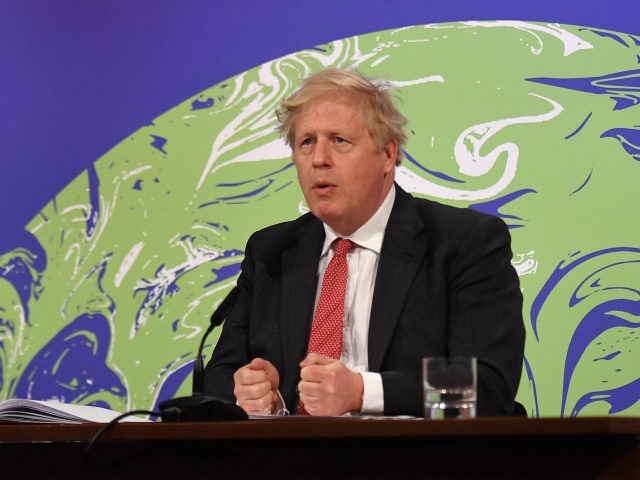A plurality of Britons want a public referendum on Boris Johnson’s plans to commit Britain to carbon net-zero by 2050, which Conservative MPs have criticised for being costly and threatening to throw the average Briton into poverty.
The survey was conducted by the major British polling firm YouGov on behalf of the campaign group CAR26, and found that 42 per cent of adults support a national referendum to decide whether or not the United Kingdom pursues a net-zero carbon policy, with just 30 per cent saying they were against a public vote and, of those, only 15 per cent saying they were strongly opposed to a public vote.
Twenty-eight per cent said they did not know.
Of those who expressed an opinion — i.e. excluding the ‘don’t knows’ — 58 per cent said they wanted a referendum.
When the findings, reported in The Telegraph, were broken down by demographic, it was revealed that of those who expressed a preference, more than half of all categories backed the vote, including young voters, the middle class, men and women, Remainers who support the EU, Londoners, and Liberal Democrats.
There was strong support amongst Brexiteers, blue-collar workers, and English Northerners. CAR26.org director Lois Perry noted: “Support for a carbon Net Zero referendum is across the board in every category, and relative support of the ‘Red Wall’ North region for a referendum was the highest at 66 per cent (excluding Don’t Knows).”
The Red Wall — traditionally Labour-voting areas that backed Brexit — is a key group whose switch in support led to Boris Johnson’s massive Conservative victory in the December 2019 General Election.
“We must not let political consensus drive us into carbon poverty. Let the people take control of the wheel,” Miss Perry said, adding: “The Government has a duty to come clean about the pros and cons and the likely costs. We demand to be fully informed and then to have our say.”
The findings come ahead of Glasgow’s hosting of the COP26 UN global summit, where Prime Minister Boris Johnson is expected to showcase his plans to impose drastic changes on Britain to cut carbon emissions, including banning new gas boilers from 2035, banning the sale of new petrol and diesel cars by 2030, and building nuclear power plants across the country.
The Telegraph reports that analysts estimate the green plans could cost more than £1 trillion over the next 30 years, with the Treasury admitting that tax rises or redirecting public spending could be needed.
Conservative MP Steve Baker, of the Net Zero Scrutiny Group, had previously warned that the plans, including replacing gas boilers with costly low-carbon alternatives, risk making Britons “poorer and colder”.
This week it was revealed that Conservative MP Philip Davies criticised the prime minister’s climate targets as “futile virtue signalling” when considered in the context of the pollution emitted by the likes of China and India and that “emerging economies in Africa are going to be increasing their carbon emissions each year”.
In the letter to a Shipley constituent dated October 18th and published by YorkshireLive on Monday, Mr Davies said that such action to cut carbon emissions in the United Kingdom “would be utterly futile, virtue signalling, gesture politics which would also bankrupt the country along with many families. The estimated cost of getting from less than 1 per cent of global carbon emissions to net zero is estimated to be £1 trillion in the UK — that is money the country and many of my constituent can ill afford; especially when the actions of other countries will make it utterly futile.”
“It is always striking how coy people are about admitting what the total cost of these actions will be and who will be paying for it,” he added.
Davies said that his remarks were an accurate reflection of those of the voters of West Yorkshire, telling YorkshireLive: “Please feel free to publicise it because a lot of my constituents will agree with what I have said.”
According to British government statistics published in June, the United Kingdom ranked 17th among the largest carbon-emitting counties in 2018, with just 1.1 per cent of global emissions.
The top five countries combined — China, the United States, India, Russia, and Japan — account for 58 per cent of all global emissions, while top-polluter China, which pumps out 28 per cent of all emissions, “was responsible for almost two-thirds of the growth in emissions since 2000”.
It is widely expected that China’s Xi Jinping will not be attending the Cop26 summit.

COMMENTS
Please let us know if you're having issues with commenting.